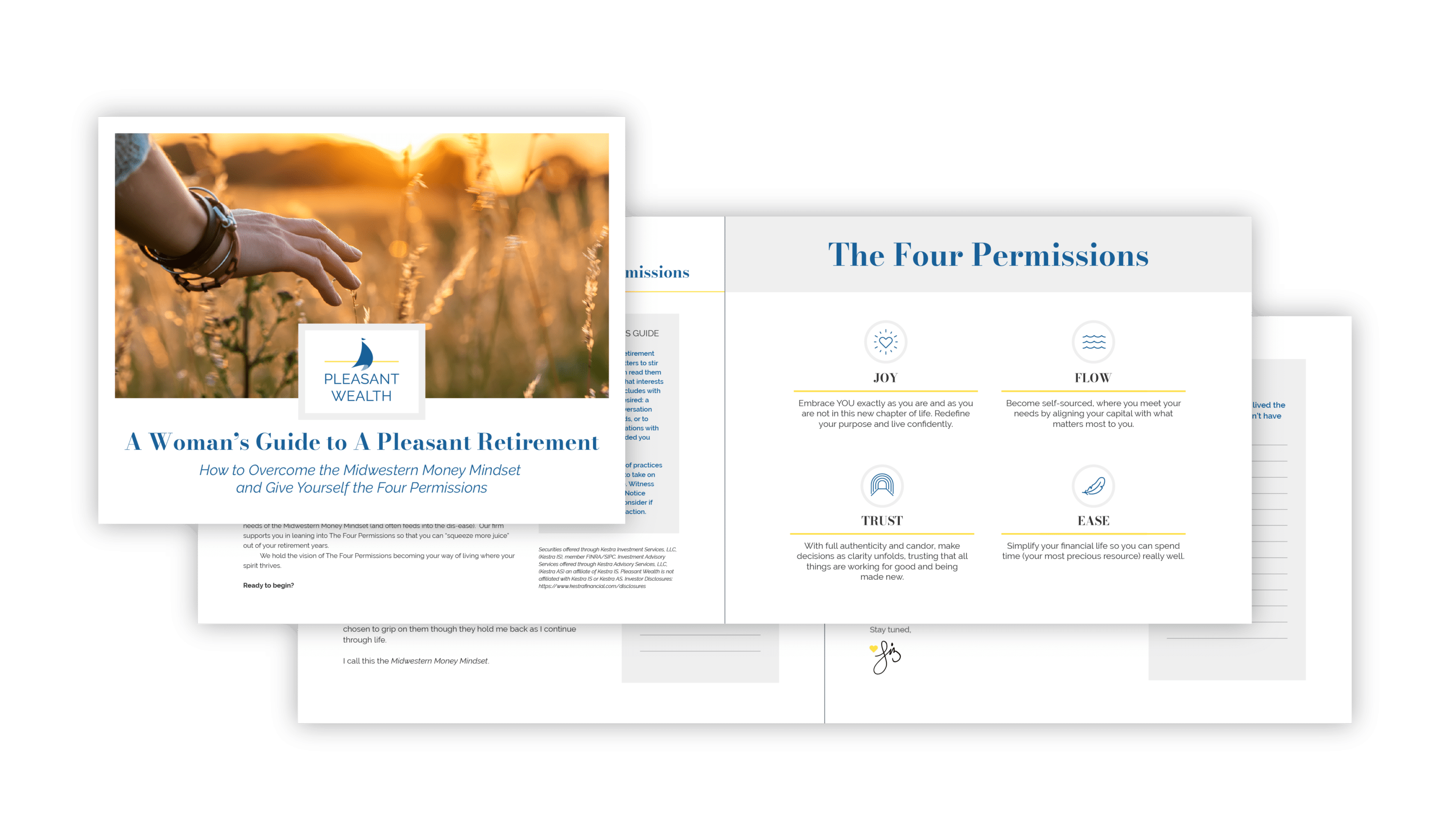Don’t go without downloading our free retirement guide!
A Woman’s Guide to a Pleasant Retirement
How to Overcome the Midwestern Money Mindset and Give Yourself the Four Permissions

Check the background of this firm on FINRA’s BrokerCheck →
It’s important to recognize that although we have a long way to go to make financial advice and decision-making more accessible for women, we’ve made quite a few strides in that area in the first quarter of a century.
In part due to some incredible advancements in technology—phone books are now ancient relics— it’s now far easier to find a financial advisor who fits your specific needs without having to rely only on recommendations from your inner circle. With the increasing accessibility, we’ve seen some interesting shifts in what people are looking for in a financial advisor.
As financial advisors, we’ve seen that shift translate to how advisors think about their relationships with clients. Some advisors believe that the relationship is simply the sales technique of talking about portfolios and planning. The cutting edge of financial services advisors view the relationship as the core source of fleshing out a financial plan; it is integral to understanding how to make money feel good for that specific person. The advisors in this second group, like ourselves, are shaping their practices to understand each individual client through a relationship that goes beyond the dollars and cents.
For example, in our firm, we have a three-pronged approach to a client relationship–a monthly group-oriented conversation for clients with all of our advisors that allows a client to understand the markets and how money fits into life, a traditional financial planning and portfolio review season held twice a year to better understand their personal financial strategy and make good decisions with their resources, and individual coaching support to help the client better understand themselves.
Not only are women searching for financial advisors, but consumers are looking for financial advisors who are women. In fact, there are more than 1,500 monthly searches for those two topics alone, according to data from January 2025 from the Google Search analytics software tool Semrush.
This increasing interest is also likely attributable to the aging Baby Boomer generation. Data from the CDC from 2022 showed women in the U.S. don’t just outlive men. They outlive them on average by almost six years, with an average lifespan of 80.2 years. Because women are outliving men, as the Baby Boomer generation ages, we are seeing women thrust into decision-making roles with their money because, if they were married, they’re more likely to be the surviving spouse.
That’s not to say women in younger generations aren’t taking more control over money. However, this dynamic within the Baby Boomer generation is why our firm has chosen to focus on retired and retiring women. There are a lot of women who need help with their money in part because, at least for Baby Boomers, the handling of money was a gender role associated with men. But if a woman outlives her husband, she is left with no other option but to manage her money. This leads us to the search for a financial advisor.
Yes, searching for an advisor is more accessible than it once was, but the search itself can be challenging. Per a Bureau of Labor Statistics report from May 2023, there were an estimated 272,190 personal financial advisors. So, the ability to find someone has become easier, but there can be an overwhelming number of choices.
Specifically, as a woman, how do you find a good list of initial options? And how do you find the ultimate best fit for you? Let’s explore three key areas to examine as part of your search: Needs, values, and cost.
As it relates to your search for a financial advisor, this question of your needs is first for a reason. Regardless of whom you pick, your needs will dictate how much value you receive from engaging with a financial advisor.
If you are unclear about what your needs are before your search, you may wind up feeling the partnership isn’t very fruitful. This can result in a disconnect between what you would like and what you’re really receiving from the advisor. And if you don’t know what it is you want, then it will be difficult to get to a point where you feel like you’re getting that.
While it’s not an exhaustive list, here are some of the common reasons people may want a financial advisor:
Do any of these options resonate with you? If you’re having trouble placing yourself into one of these areas, try asking yourself these questions:
If you’ve established your need for a financial advisor, the next component of your search is more interpersonal and involves the relationship between you and an advisor.
In a way, the second part of guiding your search is an extension of your needs. This part of the search is another need: A need to receive some sort of value from engaging with a financial advisor. This can be tangible, like having enough money to last throughout retirement. It can also be more abstract, like the reassurance that your needs are understood and you’re on the right track.
As you’re engaging with potential advisors, here are two areas women should consider to better understand the value they may receive.
Financial advisors are often boiled down to the returns they can get you on your money. But a great financial advisor, especially for women, is someone who is a great, and active, communicator. If you don’t understand what they’re talking about, it’s going to be challenging to understand the value they bring to you. Here are three practical ways to examine this facet before entering into a relationship:
With the increased access to financial advisors, you no longer need to limit your search to your neighborhood or city. You can live in Florida and have a financial advisor who lives in Ohio. (In fact, our firm has several clients in Florida).
As a result of this increased access, many financial advisors are choosing new ways to differentiate themselves. They may focus on working with employees of certain companies, people of a specific demographic, or folks with a particular planning need. While many financial advisors used to be generalists who mainly served clients locally, today’s financial advisors need to compete on a national scale.
Because of the increase in specializations, there are many more options available to you than there used to be. And it goes without saying that being a woman presents its own set of unique needs. A lot of the value you may derive from a partnership with a financial advisor will come from their expertise. So, as you’re thinking about your needs, you may uncover some specific ones that could be addressed through a unique skillset. Don’t be afraid to lean into your unique needs. You may realize there is a financial advisor, or many, who have a very narrow focus that tailors exactly to what you’re looking for, such as:
If you have questions about finding a particular type of financial advisor, don’t hesitate to reach out. The co-owner of Pleasant Wealth, Liz Hand, CFP®, ACC, is part of several financial advisor groups, both online and in-person. If our firm can’t help you, there’s a good chance someone in our network can.
Though it’s the last item in this piece, the subject of how you pay your advisor should be just as critical in finding a good financial advisor as the previous two considerations.
As we’ve addressed, there’s no shortage of financial advisors. And unfortunately, many different kinds of professionals use the term “financial advisor” to describe themselves. This spectrum of financial advisors corresponds to a spectrum of ways in which advisors are paid. If you ask any two questions to a financial advisor as you are vetting them, please ask these two:
There are ways to look up how advisors charge their clients through the SEC’s website (you can search by the advisor’s name or the firm name), though it’s not the most straightforward. But by asking these two questions, you can get a lot of information, especially if the advisor volunteers very little themselves. A non-answer starts the relationship with a lack of transparency, not a good sign of things to come. And a roundabout, vague answer may mean there are more fees and charges at play than they want to let on.
Many relationships with financial advisors can endure for many years and decades, but that should be the case because it’s a good relationship, not because you feel stuck. Seeking out and finding the right financial advisor, especially as a woman, can feel daunting. But if you identify your needs, understand the value a financial advisor is providing, and know how much you’re paying them, you can conduct an informed, intentional search.
If you already have a financial advisor, we’re always happy to provide a second opinion. And if you’re searching for the first time, our initial introduction call comes at no cost to you. You can schedule a time to meet with us here.

Clinton Miller, CFP®, is an investment advisor & financial planner with an educational background in mathematics. He enjoys making tax planning relevant for clients so they can make confident money decisions.
He and his wife Aubrey are based in Canton, OH & have two sons. In his spare time, he enjoys fishing, chainsaw repair, & mucking around in the woods.